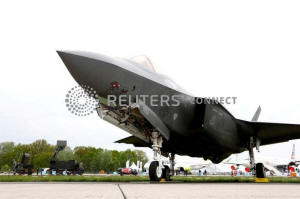|
Exclusive: U.S. will not accept more
Turkish F-35 pilots over Russia defenses - sources
 Send a link to a friend
Send a link to a friend
 [June 07, 2019]
By Phil Stewart [June 07, 2019]
By Phil Stewart
WASHINGTON (Reuters) - The United States
has decided to stop accepting any additional Turkish pilots who planned
to come to the United States to train on F-35 fighter jets, U.S.
officials say, in a clear sign of the escalating dispute over Ankara's
plans to purchase Russian air defenses.
The two NATO allies have sparred publicly for months over Turkey's order
for Russia's S-400 air defense system, which Washington says poses a
threat to the Lockheed Martin Corp F-35 stealthy fighters, which Turkey
also plans to buy.
The United States says Turkey cannot have both, but has avoided taking
steps until now to curtail or halt planned training of Turkish pilots in
the program, a reprisal that could be seen as an embarrassment in
Turkey.
The two U.S. officials, who spoke to Reuters this week on condition of
anonymity, left open the possibility the decision could be reversed,
perhaps if Turkey altered its plans. They said the decision so far only
applied to upcoming rounds of Turkish pilots and maintenance crews who
would have normally come to the United States.

There has not yet been a formal decision to halt the training of the
Turkish pilots and maintenance crews now at Luke Air Force Base in
Arizona, the sources said. Still, Reuters reported last week that the
step was being seriously considered.
Four Turkish pilots are currently training at Luke. Two additional
Turkish pilots are at the U.S. base working as instructors. Beyond those
six Turkish officers, there are an additional 20 Turkish aircraft
maintainers at the base undergoing training as well, the U.S. military
says.
Turkey has expressed an interest in buying 100 of the fighters, which
would have a total value of $9 billion at current prices.
STRAINED RELATIONSHIP
If Turkey were removed from the F-35 program, it would be one of the
most significant ruptures in recent history in the relationship between
the two allies, experts said.
But strains in ties between Washington and Ankara already extend beyond
the F-35 to include conflicting strategy in Syria, Iran sanctions and
the detention of U.S. consular staff in Turkey.
[to top of second column]
|

A Lockheed Martin F-35 aircraft is seen at the ILA Air Show in
Berlin, Germany, April 25, 2018. REUTERS/Axel Schmidt/File Photo

The disclosure of the decision on the pilots follows signs that
Turkey is moving ahead with the S-400 purchase. Defense Minister
Hulusi Akar said on May 22 that Turkish military personnel were
receiving training in Russia to use the S-400, and that Russian
personnel may come to Turkey.
President Tayyip Erdogan said on Tuesday it was "out of the
question" for Turkey to back away from its deal with Moscow.
Kathryn Wheelbarger, one of the Pentagon's most senior policy
officials, said last week that Turkey's completion of the
transaction with Russia would be "devastating," dealing heavy blows
to the F-35 program and to Turkish interoperability within the NATO
alliance.
"The S-400 is a Russian system designed to shoot down an aircraft
like the F-35," said Wheelbarger, an acting assistant secretary of
defense. "And it is inconceivable to imagine Russia not taking
advantage of that (intelligence) collection opportunity."
The Pentagon declined comment on whether it would accept new Turkish
pilots. But it has stressed discussions are taking place with Ankara
on potentially selling Turkey Patriot missile defenses, which are
made by Raytheon Co.
Erdogan said on Tuesday, however, that the United States had not
"given us an offer as good as the S-400s."
(Reporting by Phil Stewart; Additional reporting by Humeyra Pamuk,
Dominic Evans and Mike Stone; Editing by Mary Milliken and Peter
Cooney)
[© 2019 Thomson Reuters. All rights
reserved.]
Copyright 2019 Reuters. All rights reserved. This material may not be published,
broadcast, rewritten or redistributed.
Thompson Reuters is solely responsible for this content.
 |